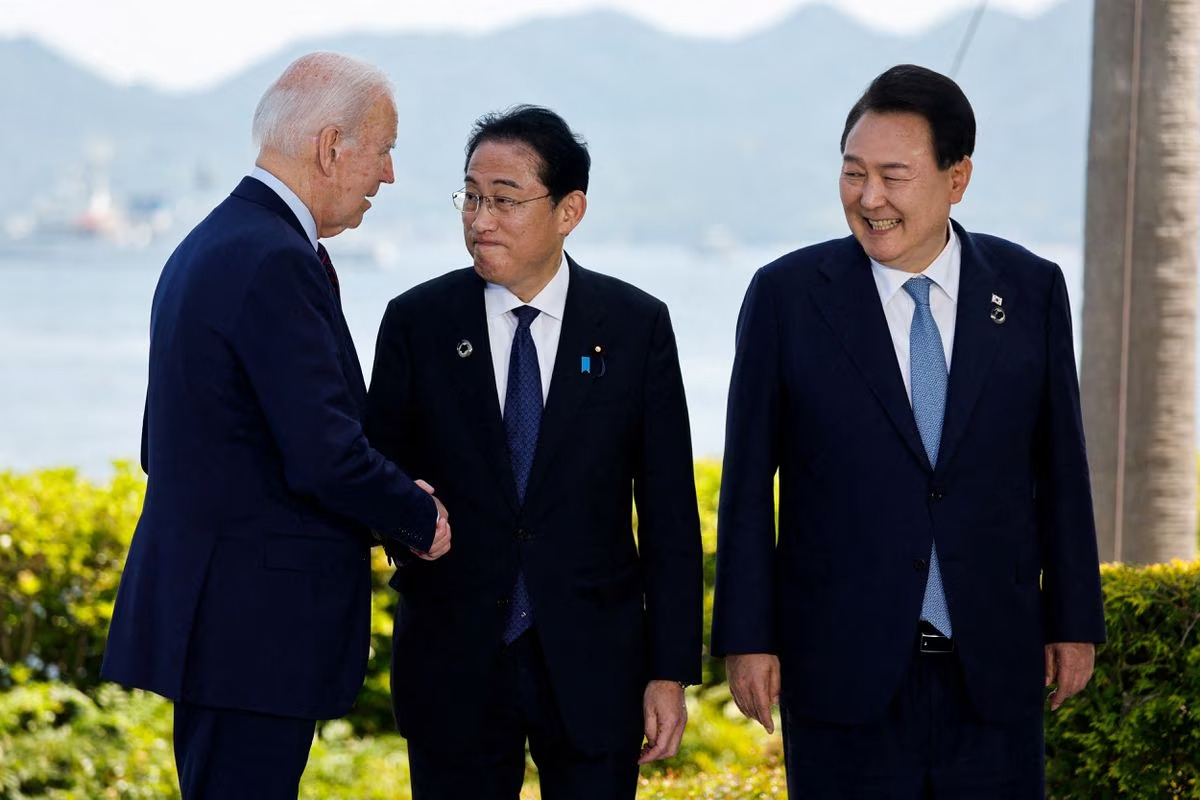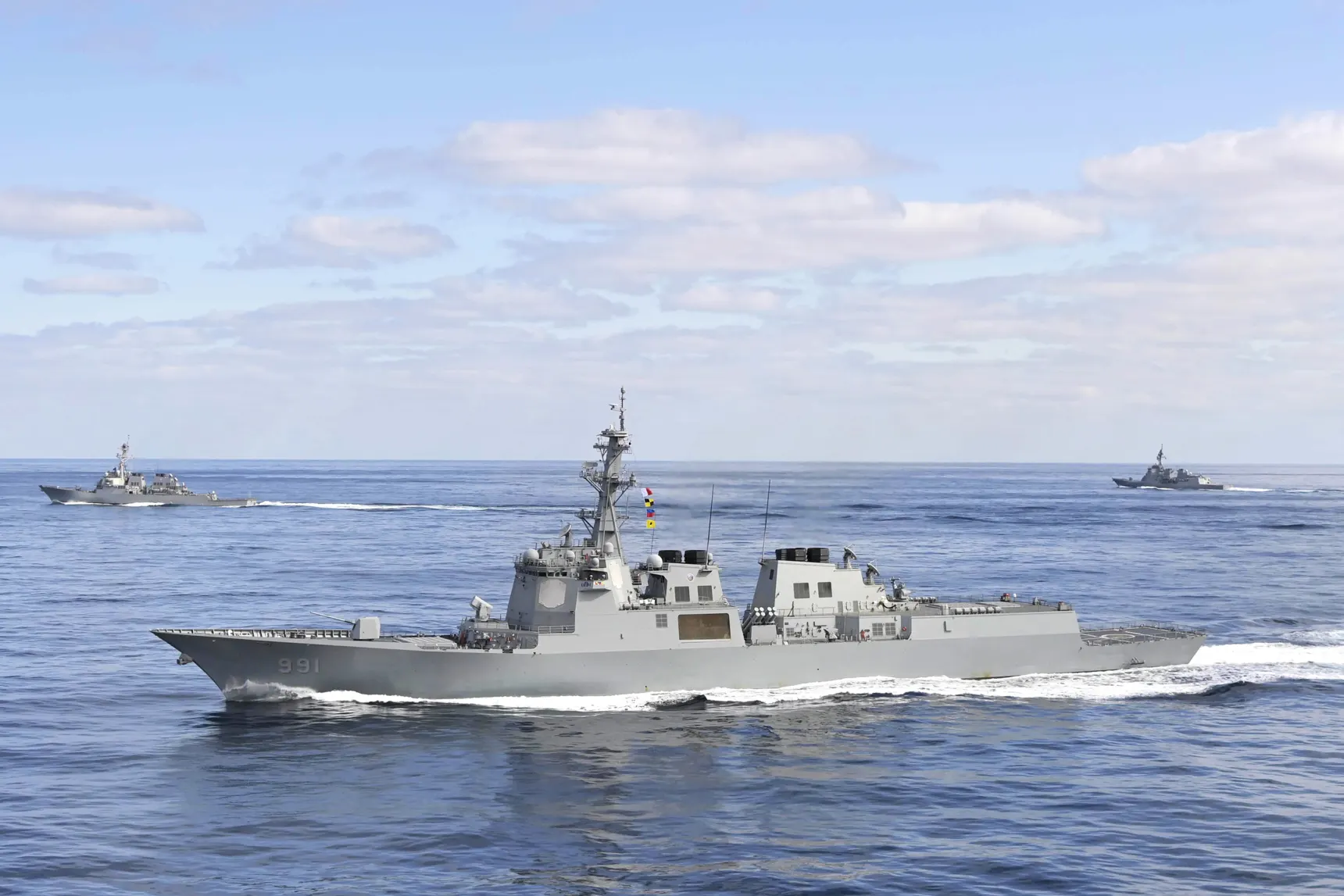
U.S. President Joe Biden, Japan's Prime Minister Fumio Kishida and South Korea's President Yoon Suk Yeol during the G7 Summit at the Grand Prince Hotel in Hiroshima, Japan, May 21, 2023. /Reuters
U.S. President Joe Biden, Japan's Prime Minister Fumio Kishida and South Korea's President Yoon Suk Yeol during the G7 Summit at the Grand Prince Hotel in Hiroshima, Japan, May 21, 2023. /Reuters
The U.S., Japan and South Korea are expected to convene a summit in Maryland on Friday, hoping to strengthen security and economic bonds. They plan to establish regular, annual trilateral summits.
The three countries also look to initiate joint military exercises around the Korean Peninsula on a regular basis, improve intelligence sharing and foster closer collaboration in areas such as cybersecurity and supply chains for key industrial sectors.
The upcoming summit will mark the first time Biden has hosted foreign leaders at Camp David, the presidential retreat in Maryland's Catoctin Mountains, since assuming office in 2021.
Camp David has a rich history of hosting both momentous and contentious diplomatic negotiations. In 1959, the site saw a meeting between Dwight D. Eisenhower and Nikita Khruschev, premier of the Soviet Union, which helped alleviate concerns arising from the ongoing Cold War, mitigating fears of a potential nuclear conflict.
"The decision to hold the summit at Camp David has more of a political significance than a purely practical one," said Feng Lin, researcher at the Institute of Modern History at Chinese Academy of Social Sciences. "While trilateral summit meetings are not unprecedented, their heightened importance on this occasion seeks to establish a sense of normalcy, lending both political and symbolic significance to the gathering."
Different aims
The U.S., Japan, and South Korea are individually pursuing specific goals, focusing on political and military objectives.
The U.S. intended to bolster trilateral security cooperation among the three countries, primarily as a strategy to manage China's influence in the Indo-Pacific region. Concurrently, this initiative seeks to encourage a more profound level of security collaboration between South Korea and Japan, as noted by Feng.
In addition to these security concerns, ongoing discussions about trilateral economic security, which commenced in February, are being driven by Washington's endeavors to guide its allies away from technology supply chains connected to China.
Feng said that the imposition of U.S. sanctions on critical chip technology, software, and equipment shipments to China could disrupt the global supply chain, hinder the growth prospects of tech giants like Samsung Electronics and, to a certain degree, impact the progress of negotiations for the China-Japan-South Korea Free Trade Agreement.
However, the extent and duration of these impacts depend on changes in the global landscape, situation on the Korean Peninsula and domestic circumstance within each country.

South Korean, American and Japanese warships during a combined naval exercise at an undisclosed location in the waters between South Korea and Japan, on Febuary 22, 2023. /South Korean Defense Ministry via Getty Images file
South Korean, American and Japanese warships during a combined naval exercise at an undisclosed location in the waters between South Korea and Japan, on Febuary 22, 2023. /South Korean Defense Ministry via Getty Images file
The U.S. aims to create a new form of Indo-Pacific multilateral cooperation mechanism, similar to Australia-UK-U.S. defense pact, the security dialogue with India, Australia and Japan known as the Quad, or the U.S. defense agreement with the Philippines.
Apart from fulfilling its strategic objectives in the Indo-Pacific region, the U.S. also seeks to address its own developmental challenges, and adjustments to the Inflation Reduction Act might be a part of the upcoming discussions, Feng told CGTN.
Japan was defeated in World War II, leading to the dissolution of its original national armed forces. In recent years, there has been a strong push to overcome the constraints of the pacifist Constitution, resulting in efforts to address matters such as the deployment of troops overseas.
For South Korea, escalating tensions on the Korean Peninsula, fueled by the DPRK's testing of military reconnaissance satellite and the Hwasong-18 solid-fuel intercontinental ballistic missile, pressured it to eagerly form a paramilitary security alliance with the U.S. and Japan.
Long-term challenges behind trilateral progress
Over the past years, both Japan and South Korea have expressed positive diplomatic intentions amid the increasingly complex situation in the Pacific and persistent nuclear threats from the DPRK. Currently, the White House is hoping the current rapprochement offers an opportunity for a shift in the relationship.
Japan and South Korea had fraught relations during the Japanese occupation of the Korean Peninsula from 1910 to 1945. In 1910, the Korean Empire fell under Japanese colonial rule. During the struggle for national independence, it faced suppression and exploitation at the hands of Japanese invaders.
Furthermore, territorial disputes persist between the two countries, coupled with recent public discontent in South Korea regarding Japan's release of nuclear-contaminated water into the sea. These factors underpin the ongoing tensions between Japan and South Korea.
"The U.S. has done a lot in mediating the disputes between Japan and South Korea, However, this endeavor is expected to encounter numerous challenges," said Feng. "The relative influence of the U.S. has waned, there are certain matters where its ability to effect change is more limited."
Apart from the historic volatility of Tokyo-Seoul relations, there is difficulty of establishing long-lasting cooperation given the political turnover in the three countries. While President Biden faces the prospect of re-election next year, Japan remains susceptible to snap elections that could arise at any moment. Conversely, South Korea's presidential elections are not scheduled until 2027.
Both South Korea and Japan are dealing with internal factions that hold differing viewpoints, adding an extra layer of unpredictability to the situation, Feng said.